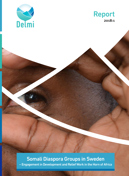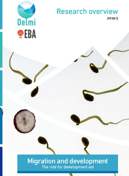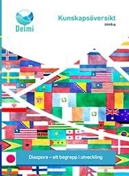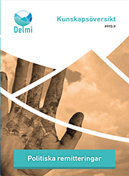The report, based on Dr. Ayalew Mengiste’s award-winning doctoral dissertation "Struggle for Mobility: Risk, Hope and Community of Knowledge in Eritrean and Ethiopian Migration Pathways Towards Sweden", is based on an ethnographic study that focuses on the social relationships that make the journey possible – including human traffickers, and relatives and friends who have previously emigrated to Europe. The testimonies presented in the report describe difficult conditions along a route where kidnappings and demands for ransom, sexual abuse, and labor exploitation have become commonplace.
Some overall conclusions and recommendations
- The European Union should bolster its current aid efforts to integrate displaced people into the local communities. Moreover, existing refugee camps must be better equipped if they are expected to meet their mission of safeguarding fundamental needs and ensuring that individuals fleeing violence can feel safer and live in dignity.
- Transit- and host countries such as Sudan and Libya lack the necessary resources to guarantee fundamental human rights to people in flight. To mitigate the hazards encountered by people fleeing the Horn of Africa, measures to combat human smuggling need improvement.
- An alternative, which might help prospective refugees avoid a hazardous journey, would be to provide provisional/temporary residence permits for study and work. By increasing the availability of legal options to enter Europe, the informal – and often dangerous – pathways would become less attractive, which would curb human smuggling.
- The Swedish government needs to better capitalize on the diaspora groups’ knowhow and commitment to integration and development. If Eritrean associations, church groups and organisations were considered as regular Swedish civil society groups, they would be able to act more easily as partners and a link to new arrivals who have been granted residence permits.
- The diaspora might for example be able to speed up the introduction to the Swedish system and thus expedite the integration process in Sweden. The Eritrean diaspora is also a group that has unparalleled knowledge of the region and, most of all, well-established channels to reach people in need - this should be a focus of Swedish immigration policy.
- Through dialogue with diaspora representatives, Sweden could contribute to rebuilding Eritrea now that there are signs that the country is becoming more democratic.
About the authors
The report, From the Horn of Africa to Sweden: Smuggling, informal networks and diaspora engagement (2019:2), is written by Tekalign Ayalew Mengiste, Ph.D., and Professor Erik Olsson, both affiliated with the Department of Social Anthropology, Stockholm University.
Picture by Clay Knight from Unsplash.




